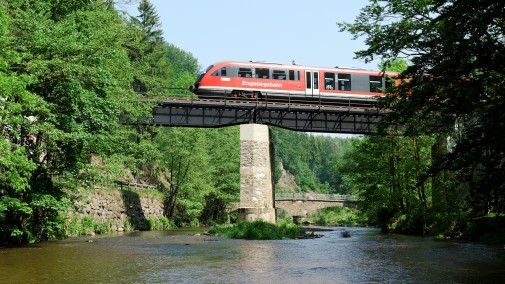Sajtóközlemények
Knorr-Bremse helps drive forward hybridization of diesel trains
2017. február 06.
Major progress achieved in eco-friendly pre-series EcoTrain
In the past, brake energy recuperation was only possible in electric rail vehicles. Now a new hybridized drive platform is bringing a paradigm shift. One core element of Deutsche Bahn’s showcase project is a new brake control system from Knorr-Bremse. Ultimately, the EcoTrain is targeting a 30 percent drop in fuel consumption compared to conventional diesel multiple units.
“Our RailServices Engineering department was responsible for developing the new brake control system for this climate-friendly hybrid concept,” explains Rolf Härdi, Member of the Management Board of Knorr-Bremse Systeme für Schienenfahrzeuge GmbH. “In the future the electric brake will take over the role of the retarder. The aim was to ensure we could actually recuperate as much of the brake energy as possible.” The system stores the recovered energy in batteries. And when it makes sense from an energy-efficiency viewpoint, the train control system switches from diesel-electric to all-electric drive. The main challenge here was to synchronize the brake control unit with both existing and new vehicle interfaces.
“We are aiming to use this brand new technology in thirteen Desiro VT 642 multiple units operated by the Erzgebirgsbahn regional railway,” say Claus Werner and Sören Claus. The duo head up the Technology Management and Technology Development function at Deutsche Bahn RegioNetze GmbH, a subsidiary of DB Regio AG. In the course of the EcoTrain project, their team joined with partners from the Fraunhofer Institute in Dresden and the Technical Universities of Dresden and Chemnitz to study eight potential hybridization concepts. They ultimately opted for a diesel-electric series hybrid concept. DB Systems Engineering adapted the bogies to handle the extra weight of the new engine, system components and batteries, and this was one reason why the braking system too had to be adapted. “A hybrid train can achieve fuel savings of up to 30 percent,” says Härdi. And there is plenty of potential for further trains to be converted to this concept. In Germany alone, at Deutsche Bahn and other rail vehicle operators some 400 Desiro multiple units are out and about. Across Europe that figure rises to around 600. Along with the economic benefits for the operator (30 percent less fuel means significant reductions in energy costs) and lower emissions of carbon dioxide, local residents near stations also stand to benefit from the EcoTrain: As all-electric drive is mainly selected when approaching and leaving stations, this is where these trains are particularly quiet. Trials will soon be starting at the more than 70 stations along the Erzgebirgsbahn routes between Chemnitz, Zwickau and Johanngeorgenstadt.







